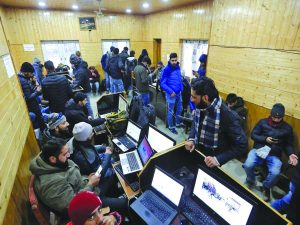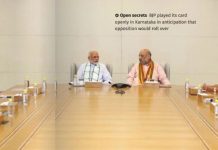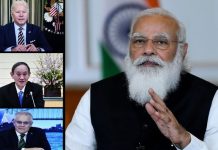 Srinagar: On January 25, the government restored a severely restricted 2G access to mobile Internet in Kashmir after a gag of around six months. Even though the institutions were selectively allowed broadband access after they gave an undertaking that they wouldn’t violate the government directions for net use, the service has been denied to common people.
Srinagar: On January 25, the government restored a severely restricted 2G access to mobile Internet in Kashmir after a gag of around six months. Even though the institutions were selectively allowed broadband access after they gave an undertaking that they wouldn’t violate the government directions for net use, the service has been denied to common people.
So while, in a sense, the internet has been restored in the Valley, the access is of a very basic nature. The people can’t open much else other than their email. “It is a struggle to access any website. In fact, it is rarely that a website opens,” says Laqeeq Ahmad, a student. “It is as good as no internet”.
Also access to websites isn’t uninhibited. In an order issued on January 24, government restored broadband and 2G internet service in Kashmir for accessing only 301 white-listed sites. The list of whitelisted sites was later expanded to include news sites. In the modified list, nearly 60 news websites were included. These include websites of prominent newspapers of the state turned union territory such as Kashmir Times, Daily Excelsior, State Times, Early Times, Kashmir Observer, Greater Kashmir, Kashmir Uzma, Kashmiri Images, Kashmir Age, and Rising Kashmir as well as national and international mainstream news websites.
Any website other than these white-listed sites will not open, a decision which, according to some, is raising net neutrality concerns.
“Instead of blacklisting the sites and banning the social media, leaving rest of internet free to access, the government has taken the easiest way out. It has whitelisted a few hundred sites and banned the rest of internet,” says Samaan Lateef, a senior journalist in Kashmir. “This is defeating the very purpose of internet. More so for the journalists who need access to all sites, to social media”.
However, people are already trying to get around the ban by using VPN (Virtual Private Network). The apps have become famous across Kashmir with everyone installing them. People share the applications in their search to get the one which is most compatible for their cellphones. With the app, users get the access to any website such as Facebook, Google, YouTube, and many other restricted websites.
This has already made the government cautious about access to broadband service to common people.
In the government order which allowed access to Internet, the Principal Secretary in the home department of the government of J&K Shaleen Kabra directed the Internet Service Providers to install “necessary firewalls and carry out ‘white-listing’ of sites that would enable access to government websites, and websites dealing with essential services, e-banking, etc, excluding, however, access to all social media sites”.
The presumed government rationale behind this blockade is that the content on social sites stokes the trouble on the street. There is an assumption of a connection between the protests on the street and the posts on social websites. Internet therefore is granted a role in abetting the trouble on the ground. Considering, spring and summer have traditionally been the seasons of discontent in the Valley, the government is unlikely to let go off its guard and give people an unbarred access to Internet. This is creating a bizarre situation in the state.
“People are willing to go without social media provided government allows them a dependable access to internet. The internet is integral to the modern life and it is inconceivable to think of going about our lives without the service. It is like going back in time,” says an editorial in a local daily. “There is thus no justification whatsoever for denying access to internet. More so, when reasons for doing so are inherently moot”.
letters@tehelka.com













